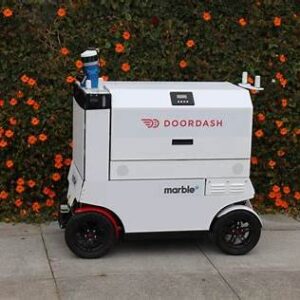DoorDash has launched a fleet of autonomous sidewalk delivery robots in Los Angeles, marking a significant step in the evolution of urban food delivery. This initiative, in collaboration with robotics company Coco, aims to enhance delivery efficiency and reduce reliance on traditional vehicle-based methods.
A New Era of Delivery
The partnership with Coco enables DoorDash to deploy compact, cooler-sized robots that navigate sidewalks to deliver meals from local restaurants. Currently operational in Los Angeles and Chicago, the service involves nearly 600 merchants. DoorDash has already completed over 100,000 deliveries using Coco’s robots, signaling a substantial commitment to this technology.
Harrison Shih, senior director of DoorDash Labs, emphasized the company’s vision of becoming a “multi-modal” delivery platform. He noted, “Not every delivery needs a 2-ton car just to deliver two chicken sandwiches.”
Addressing Operational Challenges
While the introduction of delivery robots offers numerous benefits, it also presents challenges. Instances of vandalism and theft have been reported, with some individuals kicking over robots or stealing their contents. Despite these issues, companies like Serve Robotics report a 99.9% successful delivery rate.
To mitigate such incidents, robots are equipped with security features, including loud sirens and multiple cameras. These measures aim to deter tampering and ensure the safety of the deliveries.
Enhancing Efficiency and Sustainability
The deployment of delivery robots aligns with broader goals of reducing traffic congestion and emissions in urban areas. By handling short-distance deliveries, these robots can alleviate the burden on human couriers, allowing them to focus on more complex tasks. This approach not only improves operational efficiency but also supports environmental sustainability.
Looking Ahead
DoorDash’s expansion into robotic deliveries represents a significant shift in the food delivery landscape. As technology continues to advance, the integration of autonomous robots could become a standard component of urban logistics, offering faster, safer, and more sustainable delivery options for consumers.
With ongoing developments and potential expansions, Los Angeles serves as a testing ground for this innovative approach, potentially setting the stage for broader adoption in cities worldwide.



